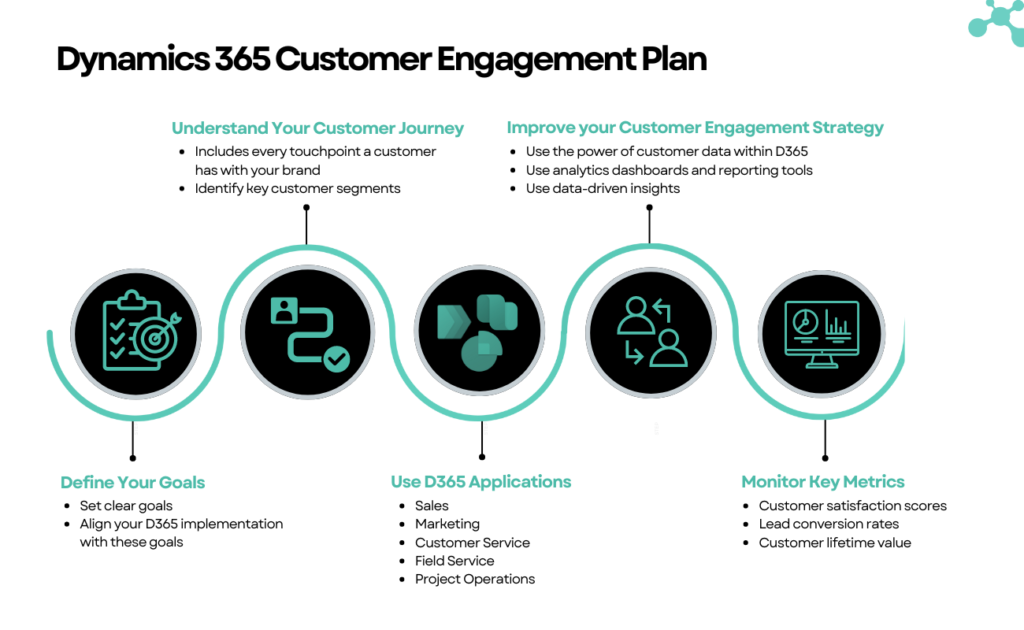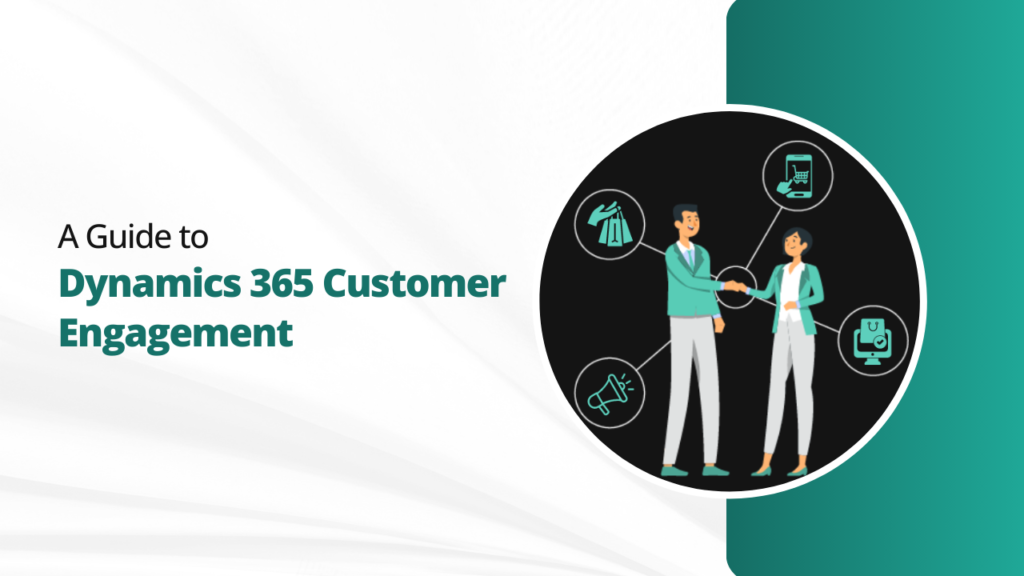Making customer service a priority is the lead indicator for customer loyalty, reducing churn, and generating more revenue. That is why modern businesses demand a customer-centric approach. However, fragmented customer data and siloed operations usually hinder engagement and growth. Microsoft Dynamics 365 Customer Engagement (CE) offers a powerful solution to these problems.
This comprehensive suite of cloud-based applications integrates sales, marketing, and customer service functions. Dynamics 365 Customer Engagement provides businesses with a unified view of their customer journey, leading to exceptional customer experiences.
This blog post will discuss the functionalities of Dynamics 365 Customer Engagement and how it boosts customer centricity and provides valuable business insights.
What is Dynamics 365 CE?
Microsoft Customer Engagement or CE is the specific set of applications within the Dynamics 365 suite that focuses on improving customer relationships. It is designed to help businesses manage various aspects of customer relationships, including sales, marketing, and customer service.
It consists of interconnected applications delivered as a cloud service. This means no complex on-premise installations are required, and you can access it from anywhere with an internet connection. The core purpose of CE is to simplify and improve the entire customer journey, from initial interaction to post-sale support.
It brings the functionalities of sales, marketing, and customer service into a single platform. This eliminates data silos and provides a 360-degree view of your customers.
Dynamics 365 Engagement Plan
The Dynamics 365 Engagement plan is the services from Microsoft that include the modules of Dynamics 365 specifically focused on customer engagement and relationship management. These apps have specific Dynamics 365 Customer Engagement features that help businesses attract, nurture, and retain customers effectively.
Here are some D365 CE modules that are included in the Dynamics 365 customer engagement plan:
1. Dynamics 365 Sales:
This module automates sales tasks, manages pipelines, and accelerates deal closure.
Key Features:
- Lead management and scoring to prioritize high-potential leads.
- Opportunity management with tracking of quotes, proposals, and sales stages.
- Sales automation for repetitive tasks like data entry, email follow-ups, and appointment scheduling.
- Mobile access for on-the-go sales activities.
- CRM capabilities for storing and managing customer data.
2. Dynamics 365 Marketing:
It creates targeted marketing campaigns, nurtures leads, and tracks campaign performance.
Key Features:
- Campaign management for planning, launching, and tracking marketing initiatives across various channels like email, social media, and events.
- Marketing automation for tasks like lead nurturing with personalized email drip campaigns.
- Customer segmentation to target campaigns based on demographics, interests, and behavior.
- Marketing analytics to measure campaign performance and identify areas for improvement.
- Landing page creation and management for capturing leads.
3. Dynamics 365 Customer Service:
It provides a centralized platform for managing support tickets, interacting with customers, and resolving issues efficiently.
Key Features:
- Case management for creating, tracking, and resolving customer service cases.
- Knowledge base management for building and maintaining a self-service resource library for customers.
- Omnichannel support for offering customer service via phone, email, chat, and social media.
- Service level agreements (SLAs) to define and track service commitments.
- Customer satisfaction surveys to gauge customer sentiment.
4. Dynamics 365 Field Service:
It optimizes the scheduling and dispatch of field technicians for on-site customer service. Ideal for businesses with field service operations (e.g., repairs, installations).
Key features:
- Efficiently schedule technician appointments based on location, skills, and availability.
- Manage your field workforce effectively, ensuring the right technicians are assigned to the right jobs.
- Provides technicians with a mobile app for viewing work orders, tracking progress, and capturing customer data on the go.
- Create, manage, and track work orders throughout the service lifecycle.
5. Dynamics 365 Project Operations:
This module manages projects, resources, and billing for customer-centric projects. Useful for businesses delivering professional services (e.g., consulting, engineering).
Key features:
- Plan projects effectively with features like task creation, dependency management, and timelines.
- Allocate the right resources (people) to project tasks based on skills and availability.
- Track project time accurately for efficient project management and accurate billing.
- Manage project billing with features like time and expense tracking, invoicing, and customer payments.
- Facilitate collaboration among project team members with built-in communication and document-sharing tools.
Here’s a roadmap to guide you in developing a D365 Customer Engagement Plan:

How Dynamics 365 Boosts Customer Engagement
Dynamics 365 boosts customer engagement by providing businesses with tools and capabilities to understand and delight their customers. Here’s how Dynamics 365 achieves this:
360-Degree Customer View:
Dynamics CRM customer engagement aggregates customer data from various sources into a unified database, providing businesses with a complete view of each customer.
Intelligent Insights:
Dynamics 365 uses artificial intelligence (AI) and machine learning (ML) capabilities to analyze customer data and generate actionable insights. These insights help businesses identify trends and predict customer behavior.
Personalized Marketing:
With Dynamics 365 Marketing, businesses can create highly targeted and personalized marketing campaigns based on customer preferences. By delivering relevant content at the right time, organizations can drive engagement.
Efficient Sales Processes:
Dynamics 365 Sales manages sales processes by automating repetitive tasks. Sales teams can focus their efforts on high-value activities, engage with prospects more effectively, and close deals faster.
Omnichannel Customer Service:
Dynamics 365 Customer Service enables organizations to provide consistent support across multiple channels, including phone, email, chat, social media, and self-service portals. This offers customers various ways to interact and receive assistance and businesses can enhance satisfaction and loyalty.
Implementation of D365 Customer Engagement Solution
Dynamics 365 offers a dynamic suite of applications to transform your customer interactions. Here’s a roadmap to guide you through a successful D365 Customer Engagement Solution implementation:
- Select the Dynamics 365 applications that best align with your goals and business needs. (e.g., Sales, Marketing, Customer Service). Consider additional applications like Field Service or Project Service if relevant.
- Create a detailed roadmap outlining the implementation process, including timelines, resource allocation, and budget considerations.
- Develop a plan to migrate customer data (contacts, leads, cases) into D365.
- Integrate D365 with other relevant business systems (e.g., CRM, ERP) to create a unified view of your customer data.
- Utilize customization features within D365 to personalize dashboards, reports, and user interfaces for optimal user experience.
- Conduct rigorous testing of the D365 solution to ensure functionality, data accuracy, and user experience.
- Develop a go-live plan to manage the transition to the new system and minimize disruption to your business.
- Provide ongoing support to your team to address any user issues or technical challenges.
Consider partnering with a Microsoft Dynamics 365 implementation expert who can provide invaluable guidance and expertise throughout the process.
Conclusion
In conclusion, Dynamics 365 isn’t just a suite of applications; it’s an investment in the future of your customer relationships. It offers various tools and functionalities across sales, marketing, customer service, and beyond. You can use its capabilities to transform how you connect with your customers. With Dynamics 365, you can gain a deeper understanding of your customers which provides you with personalized interactions.
So, take the first step towards a customer-centric future. Explore Dynamics 365 today!




